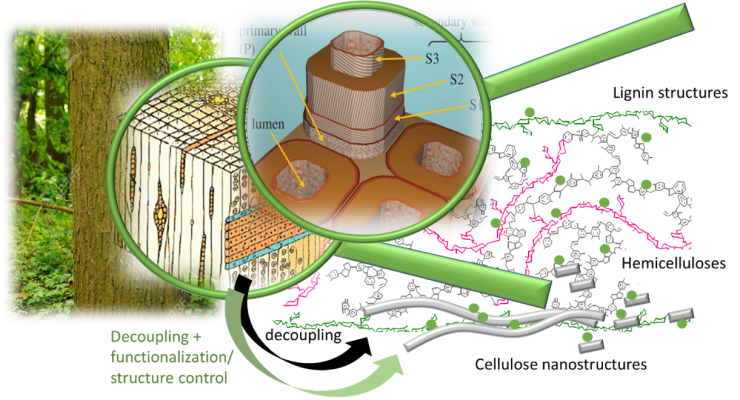I. Materials Biorefinery

Research program
The target of the Program I is to provide knowledge on structure, function and processability of wood components necessary for selective and material efficient stepwise decoupling of the wood tissue and further fractionation and valorization of the individual components.
By nature designed inaccessibility and recalcitrance of the wood tissue relies on the structural complexity and extensive interactions of wood components on several structural levels. Resource efficient recovery of these components while preserving desired functionality is, thus, a challenge and requires a deep structural knowledge and mechanistic understanding of the separation processes applied. Our efforts are focused on:
- improved precision of the decoupling processes for improved structure control and material efficiency,
- full utilization of by-products and side streams to ensure resource efficiency
- adapting separation processes and functionality of wood components to tailored applications
Our activities extend from cellulose and pulp recovery with structural control for preparation of high-performance derivatives, over oxidation mediated extraction of hemicelluloses, recovery of tailored lignin structures (including nanolignin particles and structures for energy storage application) and extractives (e.g. resin acids) to work on utilizing pulp and paper sludge. The methodology comprises chemical and enzymatic decoupling and functionalizing processes supported by advanced analytics enabling deep insight in structural changes accompanying processing and determining further applications of the obtained building blocks.
Scientific impact
Development of separation methods with improved structural control of wood building blocks, whether focused on wood tissue components or building blocks contained in waste streams / used materials, will directly contribute to a deeper understanding of the complex, but completely crucial, structure-process-function relationship of general importance for development of sustainable bioprocesses and materials. Fundamental knowledge on solubility, reactivity and heterogeneity of wood-derived building blocks as a function of origin and structure along with mechanistic understanding of their processing (including selectivity requirements) is decisive for a broader work on new separation approaches extending to other types of biomass and recycling efforts. Moreover, the analytical methodology established as a prerequisite for this work, will be of generic importance for development of sustainable biorefining and elucidation of potential applications of bio-structures.
UN Sustainability Development Goals
Program manager





